Understanding the Psychological Dimensions of Aging
As the global population ages rapidly, understanding the psychological factors associated with aging becomes crucial for designing effective care plans. This article explores theories, cognitive changes, mental health challenges, and how psychological well-being influences caregiving and end-of-life decisions, highlighting the importance of a holistic, psychologically informed approach to eldercare.
Psychological and Psychosocial Theories of Aging
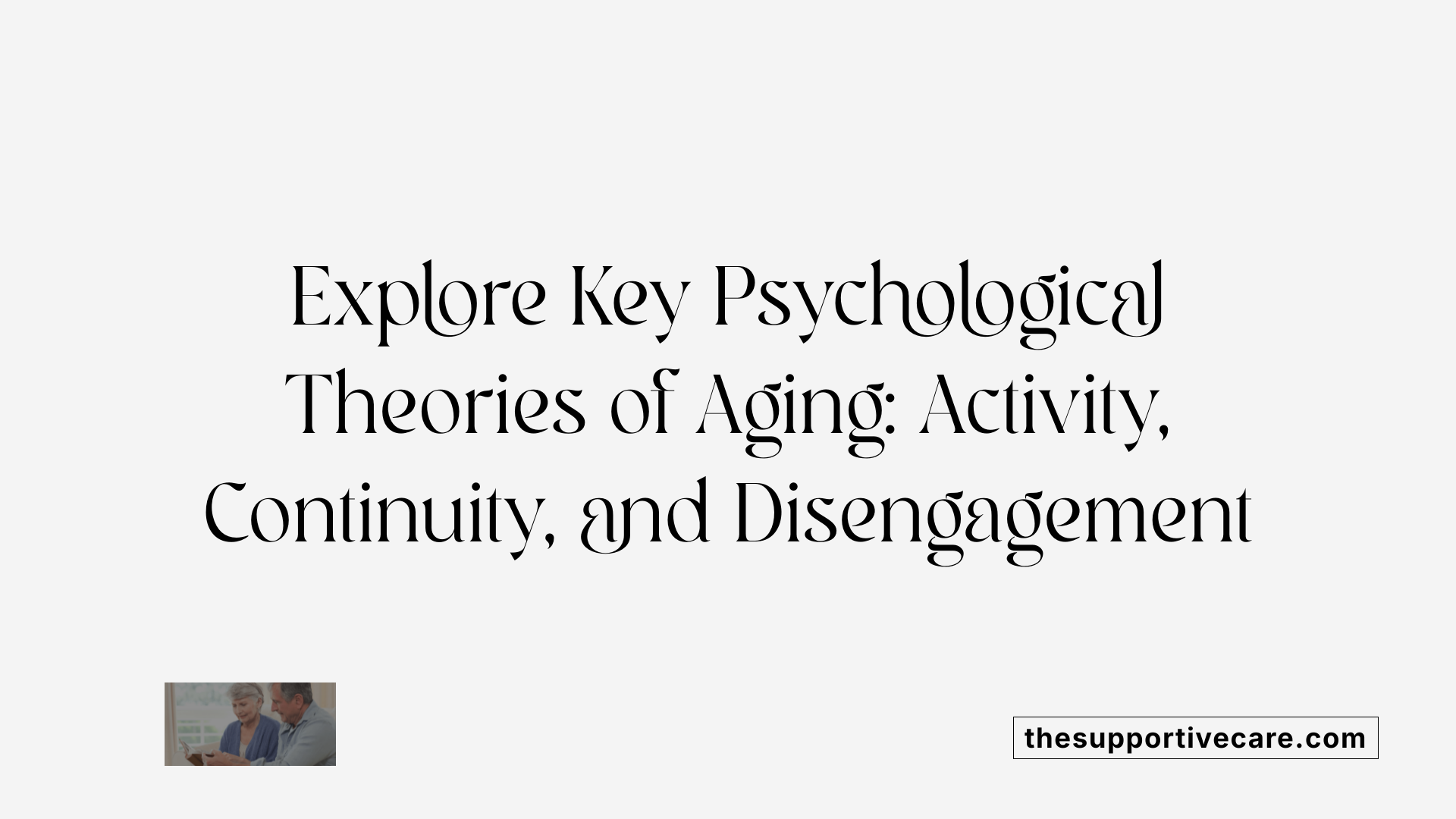
What are the main psychological theories related to aging?
Understanding how older adults adapt psychologically involves examining several influential theories. Three primary models are often discussed: activity theory, continuity theory, and disengagement theory.
The activity theory posits that staying active and engaged in meaningful activities is crucial for maintaining satisfaction and mental health in old age. It suggests that older adults who continue to participate in social, recreational, and productive activities are more likely to experience a higher quality of life.
In contrast, the continuity theory emphasizes the importance of maintaining consistency in one's habits, personality, and social roles throughout life. This approach suggests that successful aging involves preserving familiar routines and connections, which help older adults sustain their sense of identity and well-being.
Disengagement theory, which was once widely accepted, proposed that a natural withdrawal from social roles and activities occurs as part of aging. It viewed this disengagement as beneficial, allowing both the individual and society to adapt to age-related changes.
However, modern research has largely discredited disengagement theory, recognizing that active engagement and social participation are generally beneficial and that withdrawal is often a sign of illness or hardship rather than a natural, healthy stage.
Together, these theories highlight different facets of psychological adaptation in aging, with activity and continuity being more aligned with current best practices in promoting mental health among older adults. They demonstrate that aging is a complex process involving both maintaining stability and adapting to change, shaping how interventions and support systems are designed to foster healthy psychological functioning in later years.
Cognitive and Psychological Signs of Aging
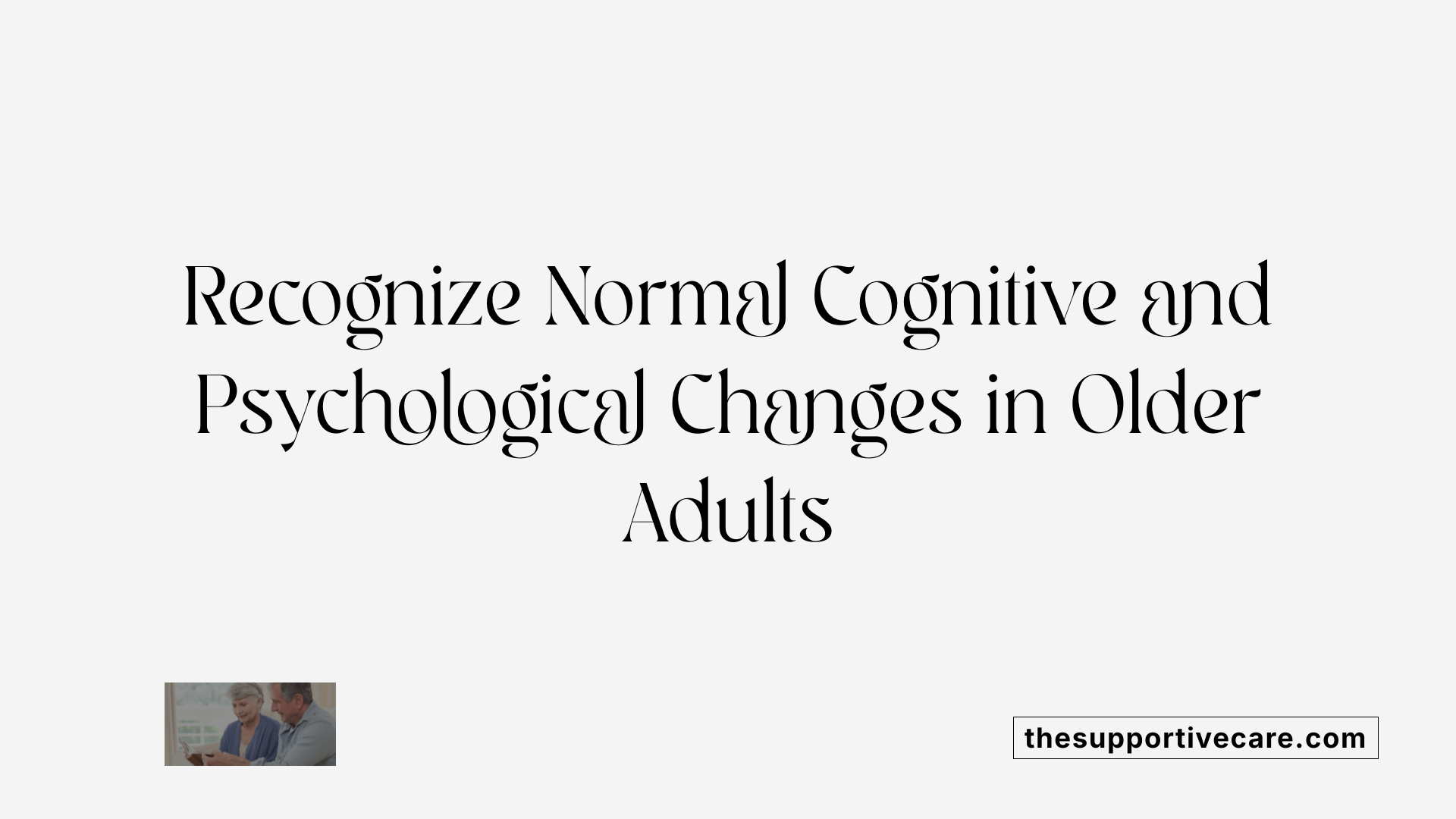
What are common cognitive and psychological signs of aging?
As people age, they often experience several cognitive changes that are considered normal parts of the aging process. These include forgetfulness, reduced attention span, mild memory loss, confusion, and impaired judgment. Such signs become more noticeable after the age of 70 and are generally not indicative of serious cognitive impairment but are natural trends associated with aging.
In addition to cognitive shifts, psychological changes are also common. Many older adults develop better emotional regulation, leading to increased happiness, gratitude, and a more mellow demeanor. This emotional stability can contribute to a more positive outlook on life despite physical declines.
However, mental health challenges such as depression, anxiety, and loneliness frequently affect older populations. These issues often go undiagnosed or untreated, partly because symptoms can overlap with normal aging and partly due to stigma or lack of access to mental health services.
Physical changes accompanying aging—such as sensory impairments (vision and hearing loss), sleep disturbances, and decreased mobility—also influence mental health and cognitive function. For instance, reduced sensory input and poor sleep can exacerbate feelings of confusion or slow cognitive processing.
Fortunately, engaging in social activities, maintaining physical activity, and stimulating mental exercises can help mitigate some cognitive decline. Regular social engagement and mental challenges promote neural resilience, which may delay the progression of cognitive symptoms in aging.
Overall, normal aging involves a combination of cognitive and psychological shifts that vary widely among individuals. Recognizing these typical signs enables older adults and their caregivers to adopt strategies that support mental health and cognitive vitality.
Psychological Changes During Aging
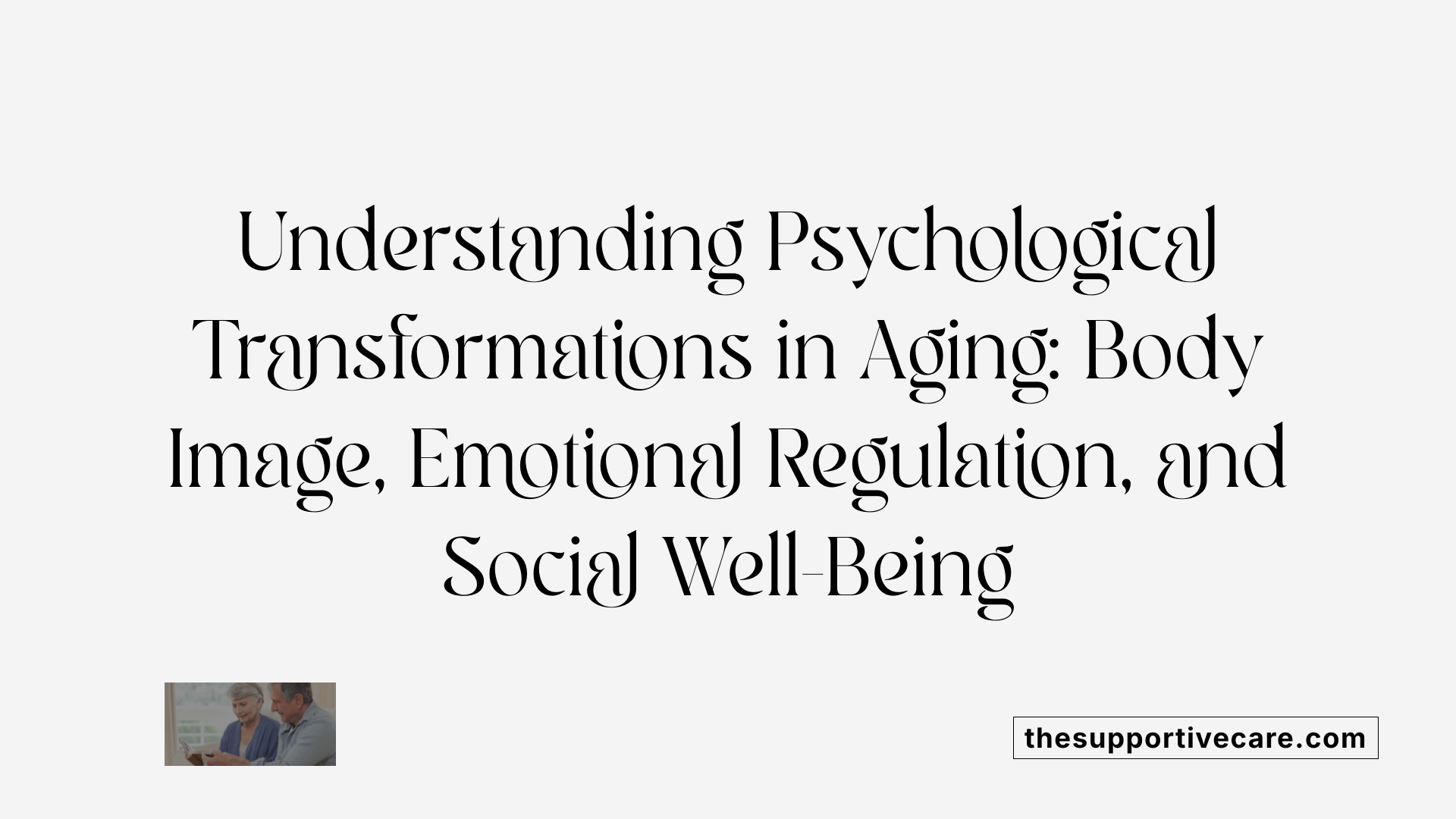
What psychological changes typically occur during aging?
Aging is associated with a range of psychological transformations that can affect mental health and emotional well-being. One common change is an increased concern with body image. As physical appearance and bodily functions alter over time, many older adults experience feelings of vulnerability or decreased self-esteem, which can sometimes contribute to mild depression or anxiety.
In addition, the risk of mental health conditions such as dementia, Alzheimer’s disease, and strokes rises with age. These conditions significantly impact cognition, memory, and emotional stability, leading to potential challenges in daily functioning.
Despite these challenges, some aspects of psychological health can improve with age. Self-awareness and emotional regulation often become more refined, allowing many older adults to manage their responses better and experience greater emotional stability.
However, aging also presents social and health-related stresses. Transitions like retirement, loss of loved ones, or declining health can increase feelings of loneliness, hopelessness, or despair. Stressors related to chronic illnesses and changes in social roles can exacerbate emotional difficulties.
Coping strategies play a vital role in promoting resilience. Social support networks, mindfulness practices, and engagement in meaningful activities can buffer the impacts of stress and foster well-being.
Overall, psychological changes during aging are multifaceted, shaped by biological factors such as neurodegeneration and hormonal shifts, as well as social influences like support systems and life circumstances. Recognizing this complexity underscores the importance of mental health care tailored to the aging population to maintain quality of life.
| Psychological Aspects | Typical Changes | Influencing Factors |
|---|---|---|
| Body image concerns | Increased worry about appearance and physical capabilities. | Physical changes, societal attitudes. |
| Depression and anxiety | Elevated risk of mood disorders, sometimes linked to health decline or social loss. | Health status, social isolation. |
| Social withdrawal | Reduced social contacts, feeling of loneliness. | Bereavement, mobility issues, cognition. |
| Dementia and Alzheimer’s | Cognitive decline, memory loss, emotional instability. | Genetics, health, lifestyle. |
| Emotional regulation | Improved control over emotional responses for some. | Experience, coping strategies. |
Understanding these psychological shifts helps in developing support systems and therapies that enhance mental health and emotional resilience in later life.
Impact of Mental Health Issues on Care Planning

How do mental health issues in older adults impact care planning?
Mental health challenges such as depression, anxiety, and dementia profoundly influence how care plans are developed and implemented for older adults. These conditions often require specialized support strategies that address both emotional well-being and physical health, ensuring a more comprehensive approach to eldercare.
Depression and anxiety can lead to decreased motivation, social withdrawal, and difficulty in making decisions, which complicates active participation in care planning. When older adults experience these issues, caregivers and healthcare providers need to adopt tailored interventions that incorporate counseling, social support, and sometimes medication, alongside practical daily support.
Dementia adds another layer of complexity, as memory loss and cognitive decline diminish an individual's capacity to understand, consent, or participate in planning their future care. As a result, family members and legal representatives often need to be involved in decision-making, making advance directives and end-of-life wishes crucial components in care strategies.
Social isolation and loneliness are prevalent among older adults with mental health issues and increase the risk of developing further mental and physical health problems. These social factors must be integrated into care planning to foster social engagement, community involvement, and emotional support, which are vital for psychological resilience.
Geriatric syndromes like frailty, incontinence, and mobility issues further complicate care requirements. They require thorough assessments and often a multidisciplinary team to develop holistic care plans that manage physical symptoms while addressing mental health needs.
Effective management of mental health conditions is associated with better functioning and an improved quality of life for older adults. Incorporating mental health care, social services, and physical health support into a cohesive care plan ensures that the multifaceted needs of aging individuals are met. Lifestyle interventions, psychological therapies, and community resources are all integral to optimizing outcomes.
In summary, mental health issues greatly influence care planning by requiring individualized, multidimensional strategies that encompass emotional, cognitive, and physical health considerations. Addressing these mental health challenges through integrated services enhances overall well-being and helps maintain independence for older adults.
Psychological Well-Being and End-of-Life Decisions
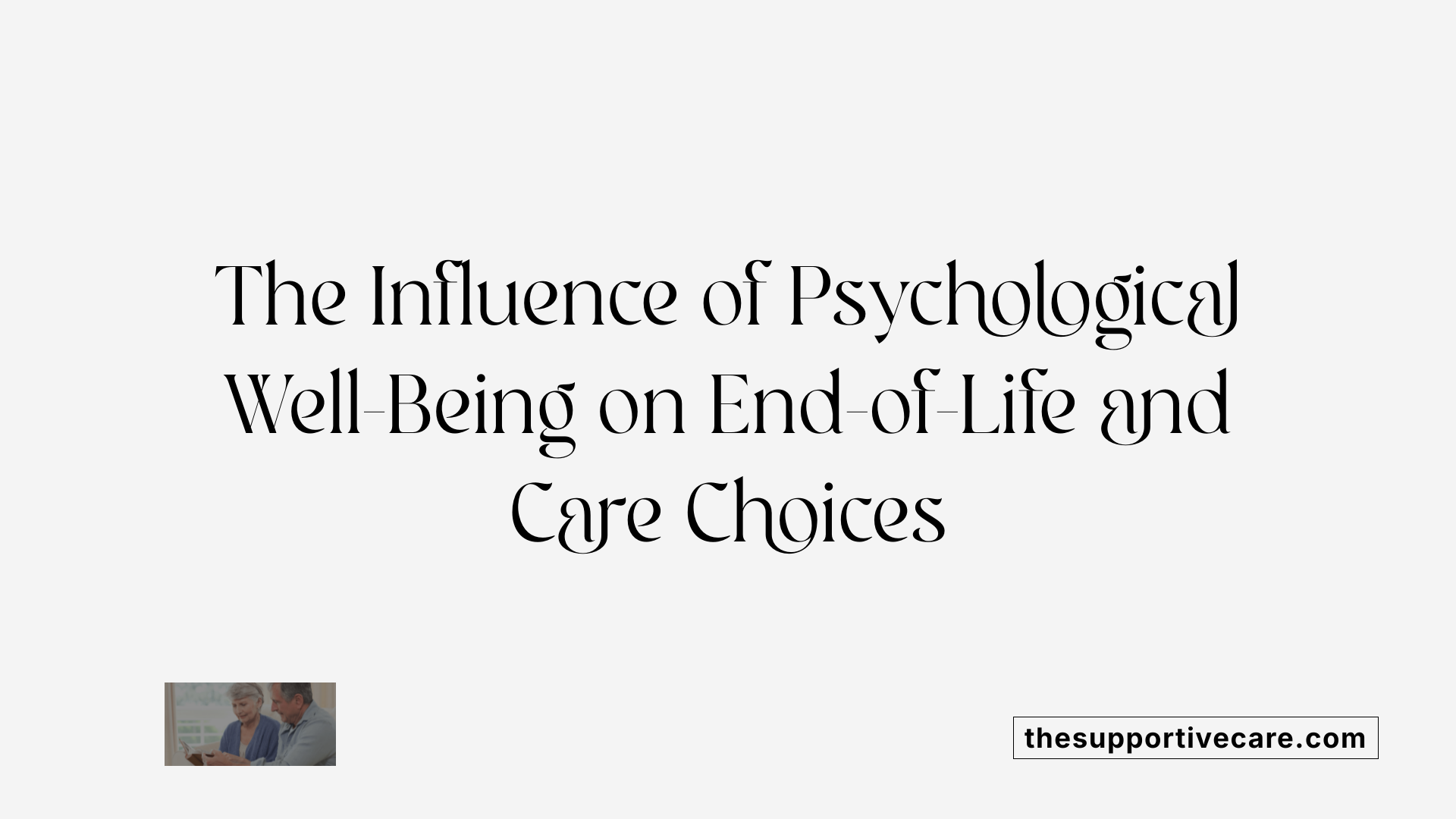
How does psychological well-being influence caregiving and end-of-life decisions?
Psychological health plays a crucial role in how older adults and their caregivers approach end-of-life planning. When older individuals maintain good mental health, they are more likely to actively participate in making decisions about their future care, which helps ensure that their preferences and values are honored. This engagement fosters a sense of dignity and control, contributing to a more peaceful and aligned decision-making process.
Conversely, psychological distress, such as anxiety, depression, or feelings of hopelessness, can severely impair a person’s ability to make informed choices. Such distress often leads to avoidance of planning discussions and can increase suffering during the dying process. For caregivers, mental health status is equally important. Caregivers experiencing psychological strain may find it harder to provide emotional support or communicate effectively with healthcare providers, which can negatively affect the overall quality of care.
Support from mental health professionals, particularly psychologists, is vital in these scenarios. Psychologists help reduce feelings of distress through targeted interventions, improve communication between patients, families, and medical teams, and facilitate advance care planning. They also work with caregivers to manage stress, prevent burnout, and maintain their mental well-being.
The interconnectedness of mental health in the caregiving and decision-making process illustrates why comprehensive psychological support is essential. Enhancing psychological well-being not only benefits the individual’s capacity to participate in care decisions but also improves the emotional climate surrounding end-of-life care, ultimately leading to more dignified and patient-centered outcomes.
Factors Affecting Advance Care Planning Engagement

What factors influence engagement of older adults in advance care planning?
Engagement in advance care planning (ACP) among older adults is shaped by a variety of personal, cultural, and systemic factors. Age is a significant element; generally, older adults who are in their 70s or above tend to be more receptive to discussing future healthcare needs. Their health status also impacts participation—those experiencing recent health crises or with chronic conditions are often more motivated to consider planning.
Education plays a crucial role. Older adults with higher levels of education are more likely to understand the purpose and benefits of ACP, which encourages active involvement. Conversely, limited health literacy can serve as a barrier, necessitating targeted education and communication strategies.
Cultural beliefs and family dynamics heavily influence how ACP is approached. In many collectivist cultures, family decision-making is preferred over individual autonomy, which can lead to collective planning approaches. In such contexts, involving family members in discussions enhances engagement and aligns care with cultural expectations.
Psychological factors, such as death anxiety or denial, can hinder willingness to participate. Conversely, a positive outlook and trust in healthcare providers can foster openness to ACP conversations.
Healthcare professional attitudes and communication skills greatly affect older adults’ willingness to engage. Professionals who demonstrate empathy, provide clear information, and utilize decision aids create a supportive environment that encourages participation.
Systemic factors—including policy frameworks, legal support for advance directives, and availability of resources—also play vital roles. Policies that promote early and routine conversations about end-of-life care help embed ACP into regular healthcare practices.
In summary, promoting ACP requires attention to multiple levels—individual characteristics, social and cultural contexts, and healthcare system support. A comprehensive approach that addresses these dimensions can significantly improve older adults’ engagement, ensuring their preferences are understood and respected.
Improving Care Strategies Through Aging Psychology

How can an understanding of aging psychology improve care strategies for the elderly?
Understanding aging psychology offers valuable insights into the emotional, cognitive, and social changes that occur as people grow older. This knowledge enables healthcare providers, caregivers, and psychologists to develop more personalized and effective care plans.
One important aspect is promoting resilience among older adults. Resilience refers to the ability to adapt positively to the challenges of aging, such as health declines or social losses. Psychologists help identify factors that foster resilience, including social support, coping skills, and positive attitudes.
Encouraging social engagement is another vital component. Older adults who participate in community activities, arts, volunteering, and intergenerational programs tend to experience better mental health, increased life satisfaction, and reduced depressive symptoms. Psychologists and caregivers can facilitate these connections to combat loneliness and social isolation.
A holistic approach to care considers physical, mental, and social health as interconnected. Tailoring interventions that include psychological support, social activities, and medical care results in more comprehensive and person-centered strategies. This approach not only addresses existing health conditions but also emphasizes mental well-being and social fulfillment.
Psychologists play a crucial role by diagnosing and treating mental health problems such as depression, anxiety, and dementia through evidence-based therapies and behavioral techniques. Recognizing the normal psychological and emotional changes of aging helps differentiate between typical aging and clinical issues, ensuring appropriate treatment.
Moreover, fostering a positive outlook on aging can significantly influence health outcomes. High optimism correlates with better adjustment to health problems, increased survival rates, and enhanced quality of life. Interventions designed to promote positive attitudes and challenge misconceptions about aging can empower older adults.
Informed by aging psychology, care strategies embrace the psychosocial principles of maintaining autonomy and dignity. These include promoting lifelong learning, self-efficacy, and participation in meaningful activities.
In summary, integrating insights from aging psychology enhances comprehensive, person-centered care. Such strategies promote resilience, social connectedness, and positive aging, ultimately improving the mental and physical well-being of older adults.
| Aspect | Focus | Benefit |
|---|---|---|
| Resilience | Promoting adaptability | Better coping, mental health |
| Social Engagement | Facilitating community involvement | Reduced loneliness, improved mood |
| Holistic Care | Addressing physical, mental, social health | Improved quality of life |
| Psychological Support | Diagnosis and treatment of mental health issues | Enhanced well-being |
| Positive Attitudes | Encouraging optimistic outlooks | Better health outcomes, longevity |
Understanding and applying aging psychology principles can transform eldercare, making it more responsive, compassionate, and effective for the diverse needs of older adults.
Community and Social Support in Elderly Care

How do community services benefit older adults?
Community services play a vital role in promoting psychological well-being and social connectedness among older adults. These services include cultural activities, sports programs, visiting and chat services, and emotional counseling, all designed to enhance mental health and life satisfaction. Such programs help reduce feelings of loneliness and social isolation, which are common risk factors for mental health issues in later life.
Accessible community activities foster a sense of belonging and purpose, encouraging older adults to participate actively in society. For example, engaging in group arts projects, volunteering opportunities, or intergenerational programs creates social bonds and combats social withdrawal.
What role do cultural and recreational activities play?
Organizing diverse cultural, sports, and recreational activities provides meaningful engagement outside the home. These activities not only offer physical benefits—like improved mobility and strength—but also serve as social catalysts. Participation in arts, music, and community sports helps improve mood, reduces depressive symptoms, and promotes a positive mental outlook.
Moreover, participation in such activities can help older adults maintain cognitive functions and improve overall life satisfaction, contributing to healthier aging.
How does social isolation impact mental health in older adults?
Social isolation, affecting about a quarter of older people, significantly increases the risk of mental health conditions such as depression and anxiety. It can be exacerbated by factors like physical disabilities, reduced mobility, and the loss of loved ones.
Loneliness and social disconnection not only diminish emotional well-being but also lead to physical health decline, including poorer cardiovascular health and increased mortality risk. Addressing these issues requires targeted community interventions to foster social inclusion and facilitate meaningful interactions.
What strategies promote mental health among the elderly?
Effective mental health promotion involves multiple approaches:
- Strengthening social networks through community groups, clubs, and buddy systems.
- Promoting healthy behaviors like regular physical activity, balanced diets, and adequate sleep.
- Providing access to mental health services tailored for older adults.
- Educating communities on recognizing and supporting mental health needs.
Supporting older adults in staying socially active and connected can significantly improve their psychological health, resilience, and overall quality of life.
| Aspect | Description | Additional Details |
|---|---|---|
| Community services | Programs aimed at social engagement | Includes cultural activities, counseling, visiting services |
| Cultural activities | Arts, music, social groups | Enhance mood, cognitive health, and social bonds |
| Social isolation | Lack of social contact | Increases depression, anxiety, physical health risks |
| Mental health promotion | Strategies to improve well-being | Community support, health education, activity participation |
Addressing social and community needs is crucial for holistic eldercare. Integrating these supports into public health policies can foster healthier, more connected aging populations.
The Role of Psychologists in Aging and Mental Health
Assessment of Mental Health Conditions
Psychologists play a vital role in evaluating mental health issues among older adults. They perform comprehensive assessments to identify conditions such as depression, anxiety, dementia, and cognitive capacity concerns. Using a variety of evaluation tools and interviews, psychologists can accurately diagnose issues that affect the mental and emotional well-being of aging individuals.
Treatment Approaches and Interventions
Treatment strategies employed by psychologists often include a range of psychotherapies and behavioral techniques tailored to older adults. Given that many seek nonpharmacological options, psychologists' interventions might involve cognitive-behavioral therapy (CBT), mindfulness-based approaches, or behavior modification techniques. These methods help manage symptoms, improve coping skills, and enhance overall quality of life.
Contributions to Aging Research
Psychologists contribute significantly to research related to mental health in aging populations. Their work includes investigating the psychological aspects of key conditions such as dementia and chronic disease management. Research fosters understanding of how mental health influences physical health outcomes, guiding better care models and policies.
Behavioral Interventions for Mental Well-Being
Given that many older adults prefer nonmedication options, behavioral interventions are crucial. Psychologists employ techniques like behavioral activation, relaxation training, and social skills development to combat loneliness, depression, and anxiety. These interventions support healthy aging by promoting emotional resilience and encouraging participation in social and community activities.
| Function | Focus Area | Typical Techniques or Activities | Impact Description |
|---|---|---|---|
| Assessment | Diagnosing mental health issues | Clinical interviews, standardized assessments | Accurate diagnosis guides effective treatment planning |
| Treatment | Managing mental health conditions | Psychotherapy, behavioral techniques | Enhances coping, reduces symptoms, and improves functioning |
| Research | Advancing knowledge about aging | Data collection, experimental studies | Supports policy development and innovative interventions |
| Behavioral Interventions | Promoting mental resilience | CBT, mindfulness, social engagement | Improves emotional well-being and social participation |
By integrating assessment, treatment, research, and behavioral strategies, psychologists substantially contribute to the mental health and well-being of older adults, making aging a more positive experience.
End-of-Life Care and Planning Discussions
What approaches improve end-of-life care planning?
Effective planning for end-of-life care begins with open, ongoing communication between the individual, their family, and healthcare professionals. Regular, honest conversations about preferences, values, and wishes help older adults feel more prepared and less anxious about their future.
One key method is utilizing structured frameworks that address multiple aspects of readiness. These include psychosocial preparedness—helping individuals cope emotionally and mentally—alongside understanding medical conditions and treatment options. This holistic approach ensures that individuals not only know what to expect but also feel psychologically ready to face end-of-life decisions.
Building trust is vital. Healthcare providers trained in empathetic communication create a safe environment where discussions about death, dying, and care preferences are normalized and destigmatized. Decision aids, such as pamphlets or digital tools, can facilitate understanding and help clarify values, making it easier for individuals to articulate their wishes.
Legislative frameworks also support advanced planning through legally recognized documents like advance directives. These legal tools formalize preferences and ensure they are respected across care settings, reducing uncertainty and conflict during critical moments.
Early and ongoing conversations are crucial. They allow for adaptability as conditions change and promote acceptance. When professionals address intent, fears, and misconceptions patiently, older adults tend to become more engaged in detailed planning.
In sum, improving end-of-life care planning involves synchronized efforts across communication, psychosocial support, legal advocacy, and policy enactment. These comprehensive strategies enhance readiness, respect individual choices, and ultimately contribute to a more dignified and patient-centered approach to end-of-life care.
Impact of Crises on Long-Term Care Decisions
How did the COVID-19 pandemic influence eldercare planning and decisions?
The COVID-19 pandemic brought about a significant shift in perceptions and approaches to eldercare. Families and individuals grew more aware of health risks associated with congregate living facilities like care homes. As a result, there was a strong preference for home-based care, driven by concerns about virus transmission in shared living environments.
Economic uncertainties during the pandemic also impacted financial planning. Families became more cautious with budgets, often prioritizing insurance, investments, and other resources to ensure eldercare needs could be met without excessive financial burden. This shift was facilitated by greater reliance on digital communication, especially as travel restrictions limited in-person visits.
Further, the pandemic accelerated the adoption of digital platforms for care planning in care homes, making the process faster and more accessible for residents, families, and care staff. This shift towards digital records supports a more individualized and transparent approach to providing care.
How has social unrest affected family eldercare strategies?
The social unrest experienced during the pandemic, including protests and civil disturbances, prompted many families to reconsider the safety and stability of their eldercare arrangements. Concerns about personal and community safety led to increased interest in proximity-based care options and exploring how to support older relatives from a distance.
Families also contemplated emigration or long-distance caregiving plans to ensure the safety and well-being of their loved ones. Border restrictions complicated remote caregiving, but many families turned to digital communication tools for ongoing support.
What are the main care strategies families adopted during crises?
During times of crisis, families have shifted towards more flexible, person-centered care strategies. These include developing detailed care plans that prioritize safety, health, and preferences. Care plans now often involve broader considerations like medication management, dietary needs, and end-of-life wishes, ensuring high-quality, holistic support.
Additionally, there has been an increased emphasis on advance care planning (ACP), with families and care professionals actively engaging in discussions about future health preferences and decision-making authority.
How did family decision-making evolve in response to crises?
Family decision-making became more proactive, with a notable increase in engagement and communication about eldercare options. Families reported seeking more information about community resources, legal arrangements like powers of attorney, and home adaptation modifications.
Crises highlighted the importance of shared decision-making, involving older adults, their families, and healthcare providers in crafting tailored care strategies. This collaborative approach ensures that eldercare aligns with the individual’s values and circumstances, especially during unpredictable times.
By understanding how external crises influence eldercare, policies and healthcare practices can better support families in making informed, resilient, and person-centered decisions that adapt to changing environments and risks.
Elder Care in Care Homes: Planning and Resident-Centered Approaches
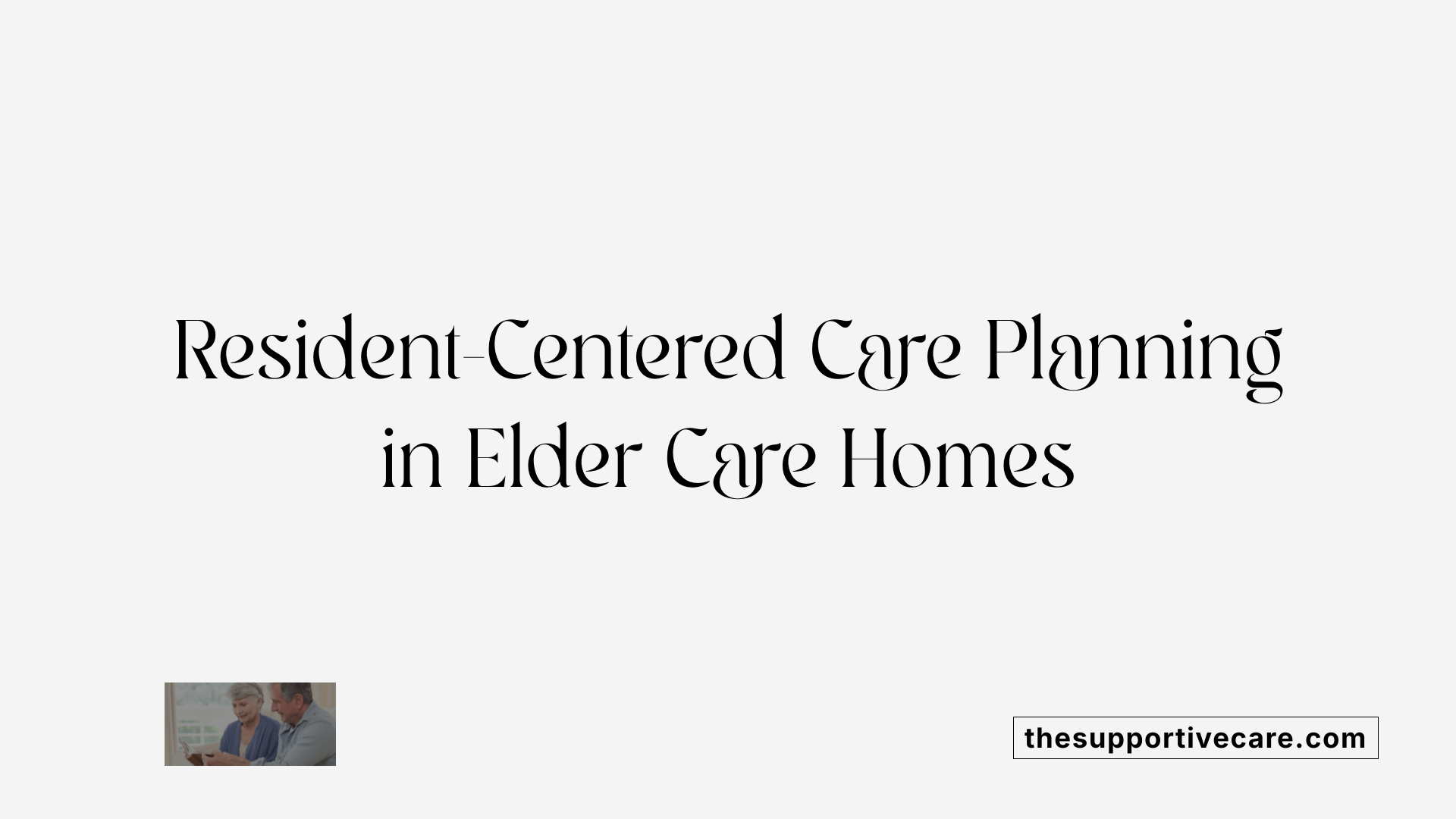
What are care plans and how do they support older adults?
Care plans are essential documents used in care homes to outline the medical, emotional, and social needs of residents. They include detailed information about medication routines, dietary preferences, personal interests, and end-of-life wishes. These plans serve as comprehensive guides for staff, ensuring consistent, personalized, and high-quality care. Regularly updated, care plans facilitate continuous assessment and adjustment of care strategies, providing a record that helps in evaluating care quality.
How is person-centered care transforming elder care?
A shift towards person-centered care emphasizes respecting each resident’s individuality, life history, and personal preferences. This approach encourages involving residents actively in their own care planning, fostering dignity and autonomy. By understanding a resident's unique background, healthcare providers can tailor interventions that improve satisfaction, mental health, and overall well-being. Person-centered care also encourages social engagement and activity participation, which are vital for mental health and life satisfaction.
What role do digital tools play in modern eldercare?
Digital platforms are increasingly adopted for care planning, offering streamlined ways to document, update, and share resident information. These technologies enable quicker data entry and easier access to records across care teams, improving communication and coordination. Digital care plans facilitate real-time updates, enhance transparency, and support continuity of care both within care homes and across health services. Additionally, technology can incorporate multimedia, such as photographs and videos, enriching resident profiles.
How is family involvement integrated into care planning?
Families are vital partners in developing and reviewing care plans. Their insights help establish a comprehensive understanding of the resident’s history, preferences, and needs. Including family members in discussions ensures transparency and aligns the care approach with the resident’s values. Care homes increasingly recognize the importance of family participation, especially during transitions into care or in end-of-life planning, which contributes to better outcomes and greater satisfaction for residents and relatives alike.
A comprehensive overview
| Aspect | Details | Additional Notes |
|---|---|---|
| Care Plans | Documented strategies for medical, emotional, and social care | Updated regularly for optimal care |
| Person-Centered Care | Focused on individual preferences, dignity, and autonomy | Enhances satisfaction and well-being |
| Digital Tools | Electronic systems for documentation and communication | Improve efficiency, accuracy, and transparency |
| Family Involvement | Engagement of relatives in planning and decision-making | Reinforces support and personalized care |
Incorporating these elements ensures elder care in residential settings is more effective, respectful, and aligned with residents’ desires. As the demand for long-term care grows, emphasizing planning and personalized approaches will remain central to improving older adults’ quality of life.
Caregiving, Transition to Long-Term Care, and Future Planning
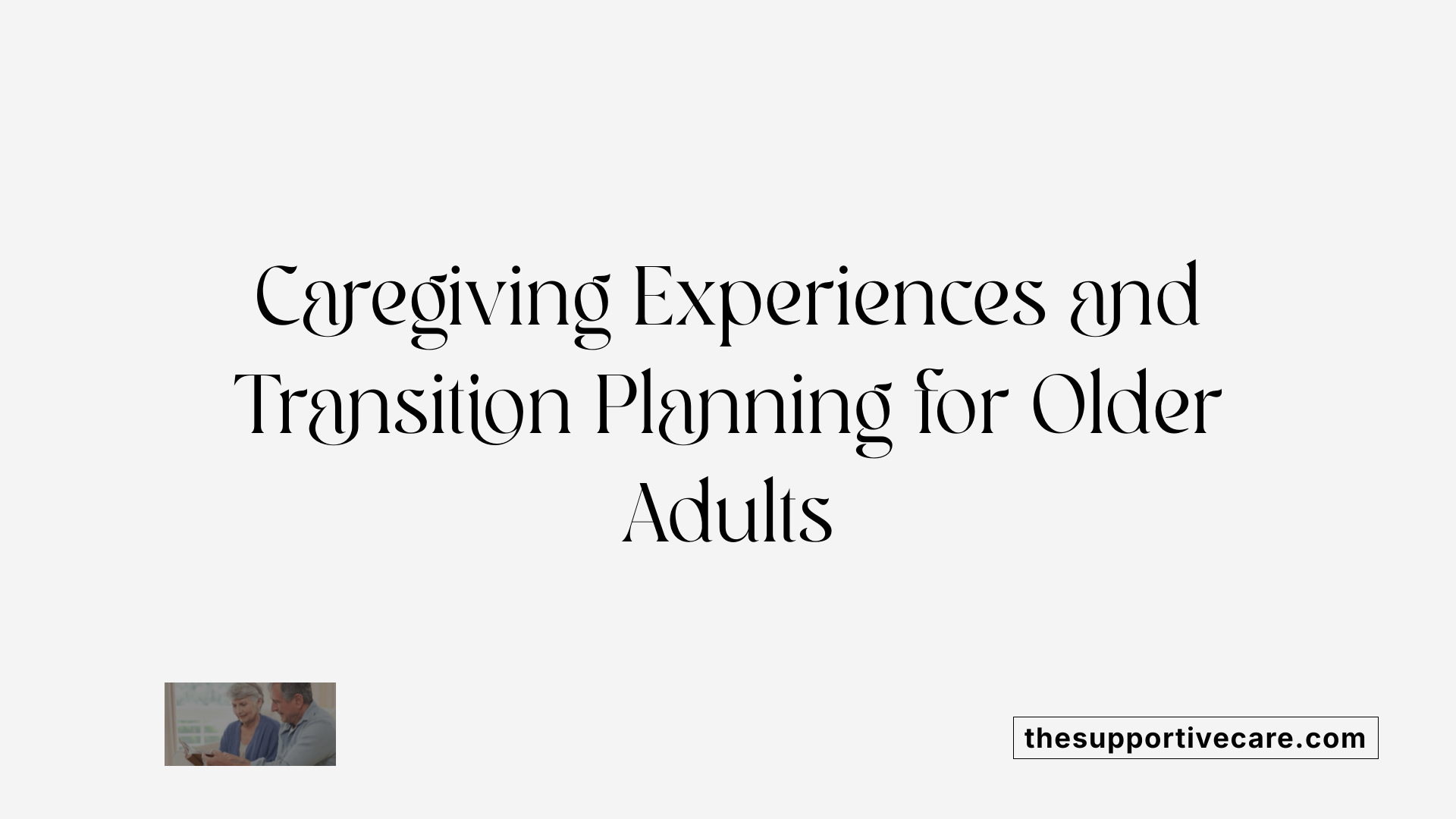
How does caregiving and transitioning a family member into long-term care influence planning?
Experience in caregiving and the process of transitioning a loved one into long-term care (LTC) play a crucial role in shaping future planning behaviors. Research indicates that caregivers who have gone through the LTC transition tend to be more proactive in planning for upcoming needs. This heightened awareness often stems from witnessing the complexities and challenges of ongoing care, which motivates families to prepare more thoroughly.
Caregiving responsibilities encompass a range of tasks—from managing medications and coordinating medical care to providing emotional support and assistance with daily activities. Such roles frequently lead to increased stress and exhaustion, but also foster a deeper understanding of care requirements and potential future issues.
The transition into LTC acts as a pivotal moment that triggers a review of existing care strategies. Families often recognize gaps in their current plans and feel motivated to develop more comprehensive approaches. This can include legal preparations, financial arrangements, and discussions about end-of-life care preferences.
Care expectations for future care heavily influence planning actions. When caregivers believe that additional or specialized care will be needed, they are more likely to engage in detailed planning efforts. Social support networks also substantially predict planning behaviors, as families with strong community or familial backing tend to be more organized and prepared.
Overall, experiencing caregiving and navigating the transition to LTC act as catalysts, prompting families to adopt long-term, anticipatory care strategies. These efforts are essential for ensuring that the needs and preferences of older adults are respected and that families are better equipped to handle future health and social challenges.
Synthesis and Future Directions in Elder Care
A thorough understanding of the psychological dimensions of aging enriches care planning by fostering tailored, proactive, and compassionate approaches. Integrating psychological theories, recognizing cognitive and emotional changes, addressing mental health challenges, and facilitating meaningful decision-making—particularly around end-of-life—are essential for holistic eldercare. Policies, community programs, and interdisciplinary collaborations must prioritize mental health and psychosocial well-being to meet the nuanced needs of an aging population. As research advances and care models evolve, placing aging psychology at the core of eldercare strategies will improve quality of life, support resilience, and uphold the dignity of older adults in every stage of their aging journey.
References
- Psychology and aging: Psychologists make a significant contribution
- Optimism and Planning for Future Care Needs among Older Adults
- Family Caregiving Roles and Impacts - NCBI
- End-of-Life Care in an Aging World: A Global Perspective - Actuary.org
- Psychological Factors in Ageing - Physiopedia
- A descriptive study investigating older adults' readiness to plan for ...
- Mental health of older adults - World Health Organization (WHO)
- Physical and Psychological Effects of Aging - Cura4U
- A meta‐synthesis on the older adults' perspective of advance care ...
- Exploring the Uptake of Advance Care Planning in Older Adults



































































































